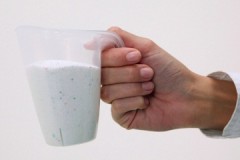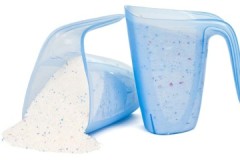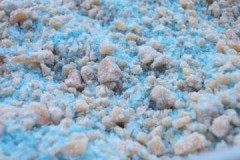Safe, Natural, Non-Pathogenic, or Everything You Need to Know About Enzymes in Laundry Detergents
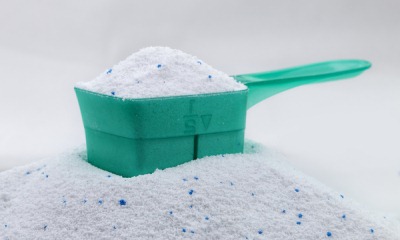 Modern laundry detergents contain many components, the significance of most of which ordinary consumers do not even know.
Modern laundry detergents contain many components, the significance of most of which ordinary consumers do not even know.
When studying the composition of washing powder, enzymes can often be found in it.
Read about what these substances are and why they are added to household chemicals in the article.
Content
What is it and why are they needed?
Enzymes in washing powder are organic enzymes of protein origin. In living organisms, they are produced by cells and are used by them to ensure metabolic processes.
Enzymes work on various types of stains:
- proteinaceous,
- fatty,
- combined,
- dyes.
Enzymes are produced in granular and liquid form. They can be single or multicomponent. Depending on the composition of the powder, manufacturers color the enzymes in different colors.
The share of enzymes in modern washing powders does not exceed 30-35%. However, technologists claim that even a slight addition to the composition significantly increases its detergency. For adding to washing powders Russian manufacturers can use only 14 enzyme preparations, including:
- Savinaza,
- Totalaza Ultra,
- Sokolan,
- Natalaza 60,
- Purafekt and others.
What are used in production?
The following enzymes are used in the production of washing powders:
-
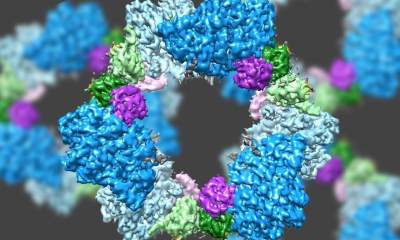 Alkaline protease... This enzyme is responsible for breaking down all protein-containing contaminants. It removes stains from blood, milk, eggs, cocoa, herbs, butter.
Alkaline protease... This enzyme is responsible for breaking down all protein-containing contaminants. It removes stains from blood, milk, eggs, cocoa, herbs, butter.These particles are practically insoluble in water and quickly settle on tissues. After binding with the protein, they form peptides that are readily degraded by the detergent composition.
- Alkaline lipase... This enzyme works well with fats and oils. They are the main helpers in the fight against sweat stains and fatty foods.
- Amylase. It is responsible for removing starchy contaminants from things, such as stains from potatoes, baby food, chocolate.Binding with molecules, amylase breaks them down into saccharins and dextrins, which dissolve well in water and are washed out from tissue fibers.
- Cellulose. This enzyme gives a special smoothness to things made of cotton fabric. Under its influence, the fibers become elastic, less electrified. Thanks to this effect, it is possible to get rid of the dirt that was kept on the puffing hairs. As a result, the fabric becomes lighter and more pleasant to the touch.
- Alkaline pectinase... This enzyme is used to combat fruit stains.
- Keratinase. This type of enzymes easily breaks down the remnants of dried protein, provides a high-quality leaching of dead skin cells from the tissue fibers.
Are these substances harmful?
Enzymes are one of the few components in washing powder that do not pose a threat to human health. They are absolutely safe as they are of natural origin..
Enzymes are not capable of causing an allergic reaction and irritation on the skin, so they can be found even in baby powder.
Enzymes - these are non-pathogenic substances... If during their production at the enterprise sanitary and hygienic standards and technologies are observed, then they will not harm the human body.
How to use the detergent correctly?
Housewives are accustomed to washing things in hot water to remove stubborn stains, and sometimes even boiling them. However, this rule does not apply to powder with enzymes. They are biological agents that break down at high temperatures. Boiling will neutralize them by 100%.
Recommendations for use washing powders with enzymes:
 before using the detergent for the first time, you must read the information for use indicated by the manufacturer on the packaging;
before using the detergent for the first time, you must read the information for use indicated by the manufacturer on the packaging;- to remove protein stains, the water temperature should remain within 30-40 degrees;
- to combat complex pollution, the water temperature can be increased to 60 degrees;
- for the best quality of washing, things should be soaked in warm water - this will allow the enzymes to fully manifest their activity and dissolve protein stains, and subsequent washing in hot water will be aimed at removing fat traces.
Selection features
Different enzymes show different activity against certain types of stains. However, it is impossible to find a washing powder in a store that would contain all the enzymes at once. This is because enzymes are substances that react with other components in laundry detergents.
For instance, high concentrations of bleaches can slow down their performance, and sometimes even provoke their destruction. Therefore, manufacturers have to find a compromise, depriving the powder of one of the components.
Top 3 best
On sale you can find various washing powders containing enzymes, but the top three included only the safest formulations, which have many positive reviews from consumers:
Percil Sensitive
This powder from the well-known German company Henkel is in demand among Russian consumers.... The formula is designed in such a way that it can be used to care baby things and clothing of people with skin sensitivities. The high quality of washing is ensured by the presence of enzymes and bleaches in the powder.
The price of a package weighing 3 kg is 350 rubles.
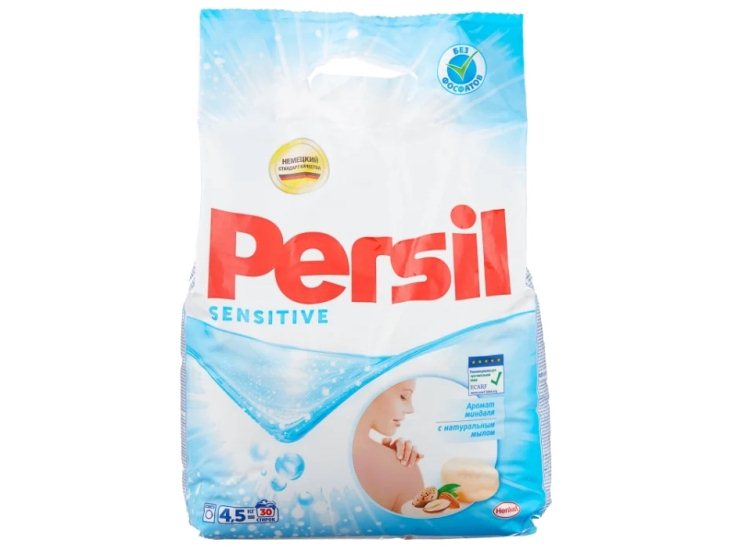
Attack Multi Action
This is a Japanese highly concentrated laundry detergent containing oxygen stain remover and fabric softener. The detergent formula is enhanced with active bioenzymes, which wash away stubborn dirt, eliminate grease on things and help remove unpleasant odors. After washing, a floral scent will emanate from the garments.
The cost of a package weighing 0.9 kg is 825 rubles.
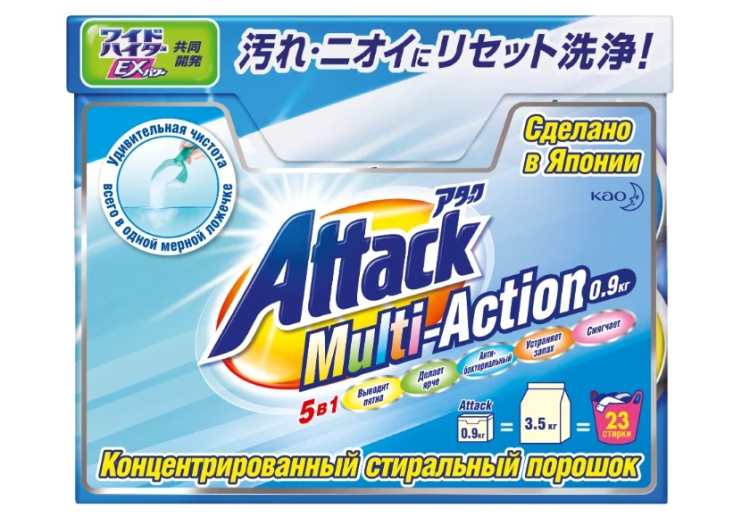
Frosch
This washing powder is made in Germany. It can be used for hand and machine wash, for items made of different types of fabrics... Frosch is suitable for washing baby clothes. The composition contains enzymes and whitening components that provide high-quality removal of dirt. The powder is free of fragrances and phosphates.
Price - 600 rubles per package 1.08 kg.
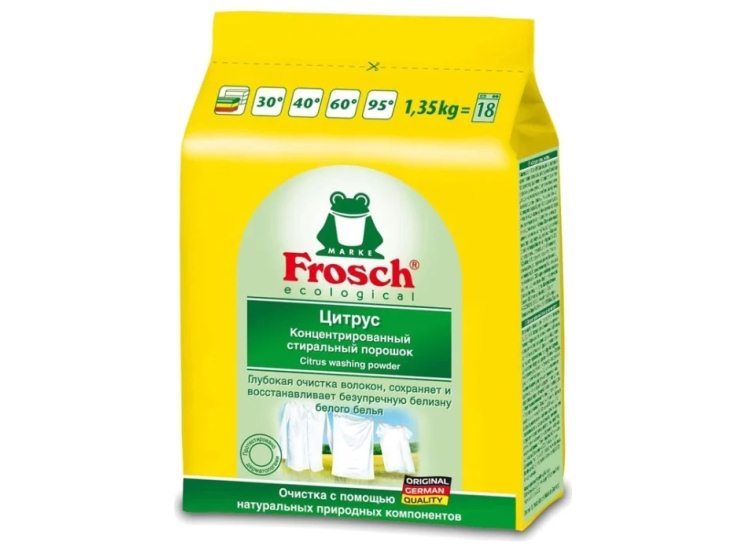
The composition and purpose of the components of the washing powder is discussed in given section.
Conclusion
The presence of enzymes in the composition of the powder should not alarm a potential buyer. These are safe components that improve the quality of washing, make the laundry smooth and elastic. For enzymes to work 100%, you must follow the manufacturer's recommendations and do not wash things in hot water.

